Greg Nugent: We have just begun
Former Marketing Director for London 2012 speaks about the most important lessons learned and how public perceptions of para-sport were transformed. 09 Sep 2013
London 2012 Paralympic Games opening ceremony
Although I think there are countless positive lessons to be learnt from the Olympic legacy, in truth, for marketeers and communicators, I think the most profound lessons should be looked at now, one year on from the Paralympic Games.
It was tempting, when looking into the published polling re: our attitudes towards the legacy of 2012, to think about writing this for the Olympic Anniversary. The re-opening of the Stadium, the return of the Mobot, the brilliant repeat of Danny Boyle's Opening Ceremony on the BBC. But although I think there are countless positive lessons to be learnt from the Olympic legacy, in truth, for marketeers and communicators, I think the most profound lessons should be looked at now, one year on from the Paralympic Games.
An investment in Britain
The public are clearly very happy with the legacy. There is good reason for this: the pace at which the Olympic Park venues have been handed over in preparation for them becoming sport venues is impressive; the new business generated abroad by British businesses as a direct result of the Games is timely given the lack of growth in the economy; the fantastic plethora of new ideas designed to capture the post Games spirit, ranging from our very own @joininuk to the fantastic @RideLondon.
Between them they show us that this thing is not over yet and collectively they demonstrate that this wasn't just 'a party', instead it was a sustained attempt to deliver on the promises made by the teams in Singapore, most critically ‘to use the power of the Games to inspire change'.
So at a rational level we are positive about London 2012. As a nation we are proud of what we achieved and it has given us a new found confidence that we can perform on the world stage.
Wonderful, but in truth we collectively did much more than that.
The emotional legacy
The Paralympics changed the way we think. And in this instance we don’t need to look just at the data to get a sense of what that means. A sold out Anniversary Games ‘Paralympic Super Sunday’ made it clear that something extraordinary happened last summer, and in this sense I think the emotional legacy from the Games was the way that we now think about disability and Paralympic sport.
Stepping back I think four things fueled this attitudinal shift. Firstly, having a British team of superhuman athletes, the majority of which we had never heard of, ready to capture our hearts.
Secondly, the thinking and planning that went into making the events happen.
Thirdly, the craft that went into engaging the public. And finally, because deep down the British public love an underdog.
To understand the scale of the shift it’s important to state just how far we have travelled.
Years before the Games it was hard to see the public going much beyond the Olympics; the Paralympics were 'not elite', 'not real sport' and ‘not for people like me’. I will never forget a particularly grim focus group in 2009 when it became really clear just how complex this campaign would be. We knew we would have to tell a different story and as a result built a project wide mantra: operational integration, creative distinction. Slowly a group people and their brands formed who became dedicated to delivering that distinction, between them executing a campaign that would build an emotional legacy perhaps without parallel. Sponsors chose the Paralympics out of conviction. BT came in early, Sainsburys recruited a certain Mr Beckham and Channel 4 went on to make the ad of the year/decade. Suddenly the Paralympics looked elite and different. Suddenly the public got onboard.
Attitudes that transcend
YOU GOV have recently published their findings on our attitudes to the Games, one year on. Perhaps the most striking thing is just how mainstream our views have become. In the early years we would be looking at a single digit minority that ‘got’ the Paralympics. Now we see widespread comprehension and positively towards the movement and its importance to British life. The Games, and the momentum created since by the BPA, have changed our perceptions forever.
Once again, many positive things for us all to learn. But for the campaign planners out there I think it’s about the fundamentals of how we campaign. Brave investment decisions, brave creativity, brave briefs and flawless execution.
And perhaps the biggest lesson of them all is that the campaign is not over, it’s still in full flow. That momentum is a lesson for us all.

 Facebook
Facebook
 Instagram
Instagram
 Twitter
Twitter
 Youtube
Youtube
 TikTok
TikTok
 Newsletter Subscribe
Newsletter Subscribe






